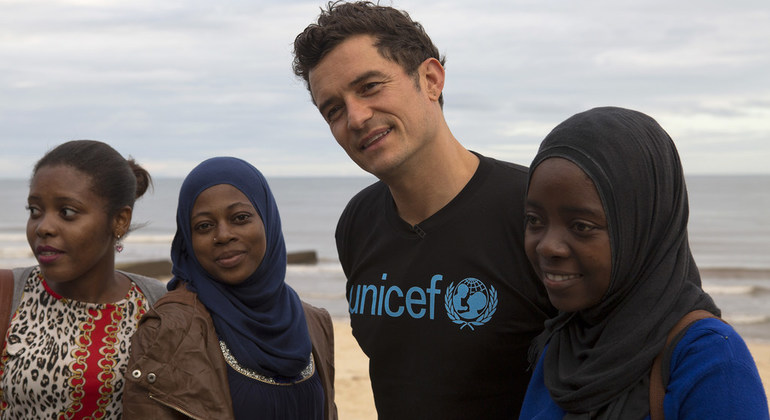During the week, the actor travelled to the coastal city of Beira, one of the areas worst-affected by Cyclone Idai, which killed over 600 people and destroyed nearly 240,000 homes when it made landfall in March.
Sitting on the sandy floor of a tent at the Samora Machel site for internally displaced people, named after the country’s founding president, Mr. Bloom listened to children recount devastating stories of how they lost everything in the cyclone.
Thirteen-year-old Alzina Lopes described the moment Cyclone Idai made landfall, leaving her stranded in waist-deep floodwaters. Now she wants to go back to school, and dreams of becoming a traffic officer.
“It’s remarkable to see children, who have been through so much, gain a sense of normality in the safe spaces set up by UNICEF, where they are free to sing, dance, play and just be children,” said the Goodwill Ambassador.
“These are children and young people with dreams, they want to be in school”, he continued “but almost everyone I’ve met here has lost their classrooms, their books and crucial identification documents due to the cyclones”.
Mr. Bloom said that it was “heartbreaking” that without IDs “they are unregistered, almost invisible and vulnerable to exploitation”.
In the aftermath of tropical cyclones Idai and Kenneth, 1.1 million children remain in urgent need of humanitarian assistance.
UNICEF is supporting families affected by the cyclones to either return home or relocate to safer places. It is also providing healthcare, nutrition, education, sanitation and protection services.
In the days following the storm, UNICEF and its partners restored water supplies to thousands of people in Beira and procured and administered one million doses of the cholera vaccine, curbing a large outbreak.
At the Mutua resettlement area in the city, currently home to around 1,500 cyclone-affected people – half of whom are youth – Mr. Bloom danced and sang with young children and spoke to them about their hopes and dreams.
The actor also visited a primary school in Beira, which the students themselves repaired after the cyclone.
Wrapping up his trip, Mr. Bloom spent an afternoon with young volunteers at an interfaith group on the beachfront – a poignant venue, as the deadly storm barrelled in from the sea. They told him that the pain and suffering they saw after the cyclones, had strengthened their resolve to help others.
“Thousands of children and families in Mozambique have seen their lives upended by these devastating cyclones and it’s going to be a long road back,” said UNICEF Mozambique Representative, Marcoluigi Corsi. “We’re working on the ground with our partners to help get children and their families back on their feet by providing support in healthcare, nutrition, education and protection”.
Mr. Corsi pointed out that as part of the recovery effort, “we’re also trying to help affected communities become more resilient to future weather-related events that could happen more often because of climate change”.
UNICEF has launched an appeal for $122 million to support its humanitarian response for children and families devastated by the storm and its aftermath in Mozambique, Zimbabwe and Malawi.


